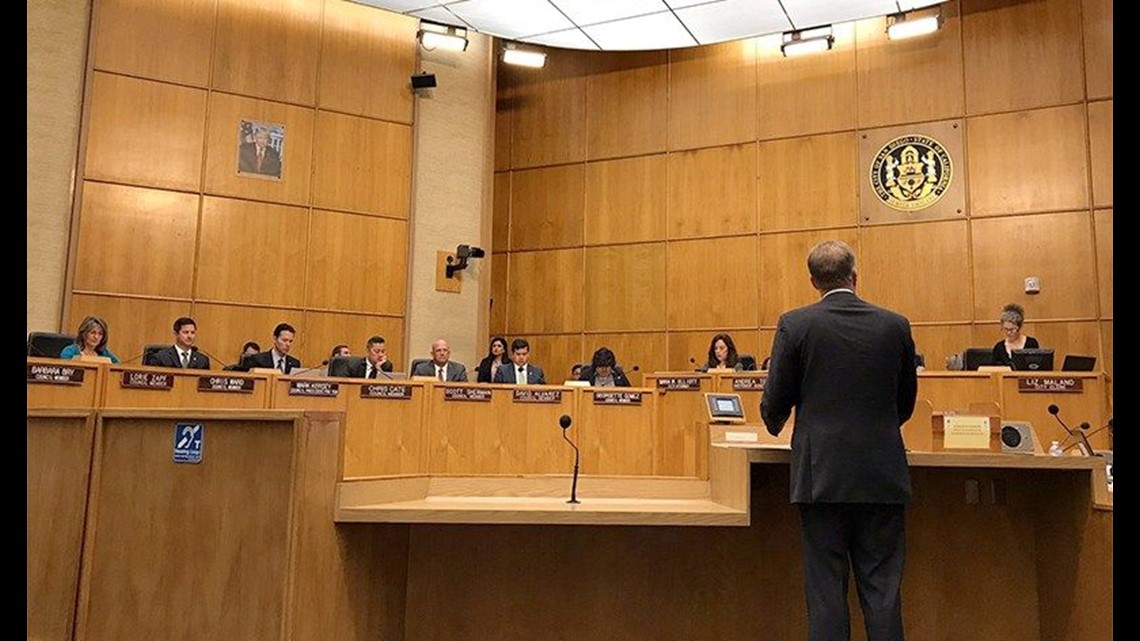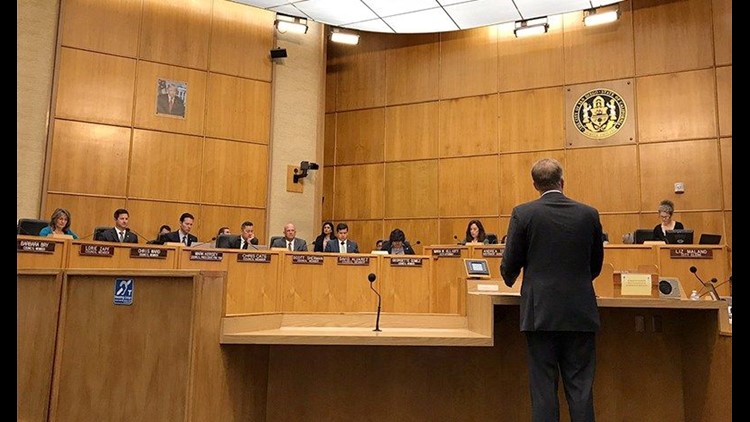

Mayor Kevin Faulconer speaks on the San Diego City Council on June 12, 2017. (Andrew Bowen/KPBS)
By Jill Castellano and Brad Racino | inewsource
This is the fifth of a five-part Follow The Money series by inewsource reporters Jill Castellano and Brad Racino, leading up to the Nov. 6 election. In this final installment, they look at Measure J, which would change the city of San Diego's charter and require companies doing business with the city to disclose all the people associated with the transaction.
The first four parts of this week's series were on Proposition 6, which would repeal a state gas tax increase; the SoccerCity and SDSU West measures, which would redevelop the former Qualcomm Stadium site; Measure D, which would require elections for county offices to be decided in November; and Measure YY, the San Diego Unified School District's $3.5 billion proposed bond measure.
Each of the Follow The Money stories will air on KPBS radio and TV and are available as inewsource podcasts on iTunes. Below is the radio transcript, which has been edited for clarity.
City Business Transparency Q&A
JILL: I'm Jill Castellano.
BRAD: And I'm Brad Racino. This is the fifth and final episode in inewsource's weeklong dive into the money behind some of the major initiatives on the November ballot.
JILL: Today we're going to talk about Measure J, which amends San Diego's charter in favor of greater transparency in our city business dealings. But we're going to do a couple things differently. First, Brad will be the expert instead of me, since he's been reporting on this topic .
BRAD: Second, we won't be breaking down the money spent supporting or opposing this measure - because there isn't any. Instead, we're going to talk about how this measure affects city money - billions in city contracts and purchases.
JILL: And we'll tell you why you should care.
JILL: All right, Brad, what is Proposition J all about?
BRAD: This measure requires companies doing business with the city to disclose all the people associated with the transaction who have a significant interest in the sale or purchase.
JILL: This measure's got a bit of a history.
BRAD: Oh, yeah.
JILL: What is this?
BRAD: A throwback. This is tape from a 1990 San Diego Housing Commission meeting. At the time, the city was about to buy two housing complexes for about $47 million to use for affordable housing.
But one councilman, Bruce Henderson, wanted a bit more information. Here he is, 26 years later, talking about that day: "I need to know for my own sake, what financial interests are in front of us? Who are we buying this from? Who's going to get this money? And the staff's response was quite literally, 'Well, it's none of your business, Mr. Henderson.'"
JILL: OK. I have to know. Who was going to get the $47 million?
BRAD: Get this. Henderson investigated and eventually found out the person selling the properties was an alleged mobster named Al Malnik. Henderson made a big stink about it, and eventually the mayor agreed and said San Diego officials should know who they're doing business with.
That led to a public vote to amend the city charter with Section 225. It requires all "entities" doing business with the city to disclose their ownership. More than 86 percent of voters approved it in 1992.
JILL: That sounds very similar to what we're talking about today, Measure J.
BRAD: It's the same thing! We did an investigation in 2016 and found the city never enforced Section 225, despite how many people voted for it.
I asked for disclosures behind more than half a billion dollars in city transactions with private companies. We're talking real estate purchases, sales, leases and more than $500 million in city contracts. Here's the kicker: Not one contract, lease or sale had all the disclosures required.
JILL: Wow. And the city's excuse was that the wording behind 225 was too vague, right?
BRAD: That's what they said. And the whole deal with this new proposition, with Measure J, is that it makes the language of that 1992 law crystal clear, so there can't be any more excuses. That's basically all it does.
JILL: And why should San Diegans care? Look up Congressman Randy "Duke" Cunningham or Jose Azano for a refresher. Some of the most well-known political corruption cases locally have involved hidden money. Here's former City Attorney Michael Aguirre talking about San Diego secrecy: "Secrecy and concealment are the mode and method of doing business in the city of San Diego."
BRAD: One more thing. Delaware LLCs are the most impenetrable corporate structures in America when it comes to knowing who's actually behind them. If Prop. J passes, these corporations will be legally required to disclose their ownership. As far as I can tell, San Diego will be the only U.S. city to mandate this.
JILL: If you want to know more about Prop. J or any of the propositions we talked about this week, go to inewsource.org or find these episodes on iTunes.
********
********
inewsource is an independent, investigative journalism nonprofit supported by foundations, philanthropists and viewers like you.
********
Read additional stories on the inewsource.org website.




